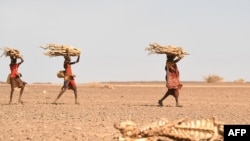"The problem is that our pastoralists have gone very far to look for pasture... They will not get a chance of coming back to vote," said Paul Paradisi, administrator of Koiting Location in Samburu County with about 6,800 residents.
Kenya holds presidential, parliamentary and local government elections on Aug. 9.
Poor rainfall means around four million people in Kenya are currently facing acute food shortages, and cases of child malnutrition have surged by half in parts of the country.
To cushion the impact, the government and Kenya Red Cross will spend some 24 million shillings ($202,190) to buy livestock for slaughter in Samburu County.
The meat from the animals will be given back to the herders after they have been killed.
Mary Yanaiyo, mother of eight from Koiting Location, told Reuters that people were suffering because the rains had failed and food prices skyrocketed.
"The children went to graze the cows far away and we don't know when they will come back," she said, as government officials and Red Cross personnel distributed meat behind her.
